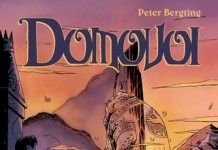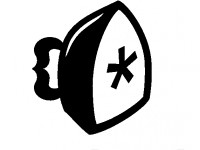See also: Jack Matthews Interview ( Part One, Part Two, Part 3, Part 4 & Part 5). See also: Jack Matthews and the Art and Sport of Book Collecting. Also, On Choosing the right name for a literary character by Jack Matthews.
 My introduction to short story writer Jack Matthews could not be more accidental. Between 2007 and 2008, I had been downloading and listening to a series of author interviews conducted by Don Swaim during the 1970s and 80s. Don Swaim did a series of 3 minute interviews with CBS Radio Services called Book Beat, presumably when authors showed up in NYC for a book tour. Swaim shot the breeze with authors for an hour, talking about random things, and later found enough material for the three minute segment that actually aired. But he saved the audio from the full interviews, digitalized them and put them online.
My introduction to short story writer Jack Matthews could not be more accidental. Between 2007 and 2008, I had been downloading and listening to a series of author interviews conducted by Don Swaim during the 1970s and 80s. Don Swaim did a series of 3 minute interviews with CBS Radio Services called Book Beat, presumably when authors showed up in NYC for a book tour. Swaim shot the breeze with authors for an hour, talking about random things, and later found enough material for the three minute segment that actually aired. But he saved the audio from the full interviews, digitalized them and put them online.
The Wired for Books interviews themselves are unpredictable, unrehearsed, meandering, sometimes dull and sometimes overly focused on topical irrelevancies (See Note below). Unlike the erudite interviews of the KCRW Bookworm podcast, (which Michael Silverblatt conducts like a graduate student eager to show off his profound understanding of an author’s oeuvre), the exigencies of a radio schedule gave Swaim little time to do real preparation. Over the decades Swaim interviewed a number of literary greats (both recognized and unrecognized). At the same time, he interviewed a lot of popular authors, biographers, historians and celebrities who had no business writing books.
Sometime in 2008, I was listening to a random mp3 while doing housework. It was a fascinating interview with a man who collected rare books and had recently published a book about book collecting. Midway through the interview, I realized I had already heard the same interview while driving from San Antonio to Houston. I remember making a mental note to look the author up, but never did.
His name was Jack Matthews, and the interview was done in 1984. (Listen to the mp3). When I googled around, I discovered some amazing things:
- Not only was Jack Matthews still alive, he was teaching classes part-time at Ohio University at the age of 84.
- Almost all of his 20+ books are available as used books on Amazon.com and half.com. If you don’t include shipping costs, about 2/3 of them are available for less than $1.
- Despite the fact that books by Matthews have received good reviews from New York Times, Time Magazine, LA Times, London Review of Books and Washington Post and blurbs from Eudora Welty, Anthony Burgess and James Dickey, not one of his books has ever received a comment on Amazon.com – not one!
- The Wikipedia page for Jack Matthews still goes to a biography of the Welsh rugby player.
When asked in the 1984 interview whether he saw talent in his writing students, Matthews talked about a professor of his once told him that in his own way Matthews was “probably one of the worst writers in the class”:
Of course it’s hard to insult somebody who has the ego to be a writer. I simply drew a line around the phrase “in my own way” and cherished that if I was going to be bad, at least I was being uniquely bad. It is hard to determine — to judge — who might or might not be successful. Certainly there are very few students who have the neural muscularity — (to use an utterly impossible metaphor) — who have the strength of nerve to become a writer. It’s a cruel undertaking — the assaults upon the ego are notorious, and that’s why a lot of writers become celebrities and celebrities generally tend to be fear biters; but occasionally you will find a student who has a natural gift..
In 2009 I read a large number of his books and interviewed Matthews by email. For the next week or so Teleread will run the complete interview broken into three parts along with an excerpt from his unpublished WORKER’s WRITEBOOK (a how-to book for student writers). I’ll also be making some posts about the works of Jack Matthews and why I feel he is important to the 21st century reader. In addition to his fiction, Jack Matthews has published reflections about the nature of book collecting and the role of libraries in our culture.
Engaging wit and irony have been characteristic of Matthews’s writing from the start, and both are strongly present in his latest gatherings of stories. His irony is increasingly darker, however, and his characters’ obsession with memory and its distortions plays a more dominant role in this later work, much of which deals with death. For the most part, these are stories with deceptively simple and ordinary surfaces, but they are driven by powerful and ominous undercurrents, which often fuse the local and regional with the archetypal. Few can do it better. Without question, Matthews has established himself as one of America’s finest storytellers.
Reading Jack Matthews: Where to Start
Let me outline his literary output and suggest where to start reading.
In the 1960s he published a poetry book and a short story collection, then HANGER STOUT AWAKE, an easygoing novel about a high school boy with a peculiar talent. In the seventies he published several other novels, including my personal favorite TALE OF ASA BEAN (the story of a cerebral geek obsessed with both sex and writing ludicrous art manifestos). His book THE CHARISMA CAMPAIGNS (a dialogue-driven tale of a used car salesman in a small town) was nominated for a National Book Award. In the 1980s after publishing the novel SASSAFRAS (about a phrenologist giving shows on the 19th century American Frontier), Jack Matthews published several story collections with Johns Hopkins U. Press (CRAZY WOMEN, DIRTY TRICKS, DUBIOUS PERSUASIONS, GHOSTLY POPULATIONS and STORYHOOD AS WE KNOW IT). He also started publishing essay collections about the philosophical aspects of book collecting, starting with BOOKING IN THE HEARTLAND. Since the 1990s, he has continued publishing collections of stories and essays every few years. These are more of the same (and wonderful). In the current century he has returned to shorter literary forms and poetry. SCHOPENHAUER’S WILL was published in Czech translation overseas a few years ago, but has still not found a publisher in the US. His most recent collection ABRUPTIONS (“short stories which end abruptly”) is still looking for a publisher, while his next novel GAMBLER’s NEPHEW will be published in 2011.
 Start by reading any of his short story collections from the 1980s or 1990s. They are inventive and philosophical but generally easy-to-read (my personal preference is CRAZY WOMEN – where every story contains at least one crazy woman!) Also, let me recommend TALES OF THE OHIO LAND, a series of original historical tales that seem to read more like American folklore than short stories. Full of incident and bits of history, I think any middle school student would be able to get into TALES (which is adorned with lovely drawings from Matthews’ own daughter). Most high school students could get into HANGER STOUT AWAKE and identify with the narrator (although some of the references might seem dated).
Start by reading any of his short story collections from the 1980s or 1990s. They are inventive and philosophical but generally easy-to-read (my personal preference is CRAZY WOMEN – where every story contains at least one crazy woman!) Also, let me recommend TALES OF THE OHIO LAND, a series of original historical tales that seem to read more like American folklore than short stories. Full of incident and bits of history, I think any middle school student would be able to get into TALES (which is adorned with lovely drawings from Matthews’ own daughter). Most high school students could get into HANGER STOUT AWAKE and identify with the narrator (although some of the references might seem dated).
For essay collections, I’d start with BOOKING IN THE HEARTLAND which consists of philosophical digressions about book collecting. This book is positively Emersonian – especially in the first essay called “Wasting Time.” It is also funny and thought-provoking; one of my alltime faves! The later volumes of essay collections (MEMOIRS OF A BOOKMAN, READING MATTER: A RABID BIBLIOPHILE’S ADVENTURES AMONG OLD AND RARE BOOKS and BOOKING PLEASURES follow the same basic formula as BOOKING and are just as interesting. (His 1977 work COLLECTING RARE BOOKS FOR PLEASURE AND PROFIT is interesting but a little dated).
I haven’t read any of Matthews’ fiction books from the current century (none of them have been published yet on American soil!), but they sound more aphoristic and experimental, more concerned with form and genre and less concerned with entertaining people around a campfire. If you want to get a sense of what the 21st century Jack Matthews is like, you could read several flash stories he published in Agni Review under the pseudonym Matt Hughes. For me they read more like philosophical fables than flesh-and-blood stories, but they are still fun.
As I mentioned, the 25 minute 1984 Wired for Books interview is good. It is available in both mp3 and streamed Real Audio files. If you can deal with Real Media streaming, you can hear Jack Matthews read his mysterious/supernatural story Girl at the Window (which strikes me as interesting in a Turn-of-the-Screw way). Also, marginally relevant (but still fascinating) is a 46 minute dialogue between Don Swaim and Jack Matthews about Ambrose Bierce. (A little backstory: Don Swaim is a Bierce fanatic, as his personal website will show and Bierce hails from Ohio – as do Swaim and Matthews).
Finally, for those who stubbornly refuse to read anything not readable on an ebook reader, I am happy to report that my city library subscribes to JSTOR , a scholarly journal archive that lets patrons download full-text articles as PDFs from selected literary magazines (such as Antioch Review and North American Review). In less than 5 minutes I had downloaded 30+ PDFs out of the 200+ JSTOR search results. In fact, Jack Matthews has published widely in literary journals (and most of these things later turn up in books); they just can’t be found by googling. (If you’re using JSTOR, try looking for the excellent “The Library: Whose Apple” essay from the Antioch Review). Most libraries probably have similar subscriptions available for patrons.
Neglected Writers: Why Don’t They Just Get on Twitter?
Those in publishing know there is nothing particularly unusual about an author being underappreciated or unrecognized. His books going out of print…..yawn! Should we continue to act surprised when celebrity “authors” are invited on talk show to promote their “books” while at the same time career writers have problems getting published (much less reviewed). Join the club, most would say.
Even if we accept these things as part of the cold hard reality of publishing, the case of Jack Matthews still seems unusual. Naturally I don’t expect everyone to share my superlative assessment of his oeuvre. But I expect bookish people at least to have heard of him. Even my bookish friends who go out of their way to read the latest novel from Africa or the experimental novella from 50 years ago draw a blank at the mention of the name. Matthews has been publishing reliably in college literary journals; two university presses (JHU and Ohio U) have published his books (in addition to Putnam, Harcourt and Scribner’s). Oddly, Johns Hopkins Press was publishing his works at the same time I was getting my master’s from their creative writing program. Yet I never heard anything about Matthews (and neither did other JHU classmates). It was only blind luck that I stumbled upon the audio interview 20 years later.
Sure, writing is its own reward, and Matthews has had a successful career by many measures; surely he is well-known by literati inside his home state of Ohio. But what is Ohio anyway? With a population of a mere 11.5 million — surely no well-known author has ever managed to come out of that literary backwater (more).
The reasons 84 year old Jack Matthews still has not received a single review on Amazon.com are obvious. He has not opened a Twitter account, started a Facebook fan page, launched a blog, put up a promotional video on Youtube or adopted the the latest technological/promotional fad-of-the-week. Out of all the literary shortcomings a storyteller can have, technological idiocy is by far the most unforgivable.
Only a fraction of deserving authors are ever noticed by prize committees or the generous eyes of Oprah or the New Yorker. What should older & obscure midlist authors do in the meantime? Even literary bloggers (who go out of their way to seek out quality writing) seem to be more focused on winnowing through the best offerings from Amazon vine than uncovering neglected writers. That is understandable; given that the number of books published annually has doubled between 2003 and 2008, one can hardly blame them for preferring not to linger in the hazy past of the 1980s.
As I said, I don’t expect readers of this essay to agree with my literary assessment; you should make up your own minds by reading Matthews yourself. But Matthews is not a hard writer; occasionally he experiments with technique and at times his style can be sophisticated (but never abstruse); sure, his latest (unpublished) fiction seems esoteric and cerebral, but most of his fiction is accessible and easy-to-read; it portrays ordinary life with sincerity, compassion and humor. Surely a book club that reads Roberto Bolaño or Jhumpa Lahiri would have little problem understanding or appreciating Jack Matthews.
It is commonplace to lament the decline of literary standards or the decline of reading overall. That is not the problem. We just have more of everything: more crap, more genius and more stuff in between. On the flip side, that leaves us less time to go exploring different authors, less time to take a chance on unknown qualities. Already we have 108 years worth of Nobel Prize winning authors to catch up with; we could probably spend our entire adult years just reading works by Nobel Prize winners and have time for nothing else.
This literary abundance is something to be thankful for. At the same time it virtually guarantees that many great writers will remain invisible to readers and critics. I mention the fact that Jack Matthews has received no Amazon.com reviews as an unfortunate consequence of obscurity. But not receiving a single customer review is a common occurrence for ebooks and self-published books. How many times have you bought a book online simply on the basis of glowing reviews on Amazon.com or changed your mind when you realized there were none ? A while back I forwarded to Mr. Matthews a scabrous (and totally unfair) review of one of his books from an online site. Both of us laughed it off. At the same time, we were amazed and almost gratified that someone had taken the time to read and hate a book so vigorously. It was almost reassuring.
In his book-collecting journeys, Matthews acknowledged the rare circumstances of discovering a book:
A book is, after all, part of a message: it is the transmitting part of that does not become a full message until it is received or read. Consider a used-book store, with shelves crowded to groaning under their thousands of books; then consider how many of these books are being read now, or have been read within the past year, or even the past decade, by anyone.
In short, it can be an adventure and an excitement to read from an old, forgotten book and thus receive a message no one else today is taking in, or no one else remembers clearly. It is an act of liberation, of freedom, to pick up a volume on impulse, give it a few minutes and listen to the message it is sending out. No doubt most of the books you pick up will prove worthless to you at that time; still you have given them another chance, and you haven’t really wasted your time. (Collecting Rare Books for Pleasure & Profit, p 24).
From the author’s point of view, the public’s neglect of his works can be dispiriting. But from the reader’s point of view, this neglect provide a delicious opportunity to discover a new and unfamiliar wine … and then to share it with everybody.
August 29, 2010 Update. I am writing a collection of essays about the liteary works of Jack Matthews. For this project I have created a new website www.ghostlypopulations.com that will provide news & updates about Jack Matthews as well as my progress writing that book.
************
Notes:
More about the Wired for Books interviews. Yes, I have listened to all 250+ of the WFB interviews. They run the gamut, and about 30% could be classified as “celebrity interviews” but most are entertaining and insightful. Part of the charm of these interviews comes from the fact that the author guests never expected that the full audio would ever be archived somewhere. They thought they were recording only a 3 minute interview. Interviews I recommend: Ray Bradbury (what a raconteur), Barry Hannah, Thomas Keneally, Jane Smiley (total egghead), John Barth (IBID), James Dickey (highly entertaining and insightful), James Michener (not a fan of his fiction, but his anecdotes here were great) Jerzy Kosinski (he sounded like a loon and he was defensive about a minor literary scandal, but still an amazing interview), Harold Brodkey, Henry Louis Gates (talks about unearthing early African-American novel Our Nig) William Shirer (talked about WW2 reporting), John Gardner (sounds more modest and open-minded than I expected), Walter Tevis, P.D. James (never expected to enjoy this as much as I did), Doris Lessing, Han Suyin (great interview! brilliant and fascinating Asian woman!) Fred Rogers (Mr. Rogers!), Karl Shapiro, and Raymond Carver (the two interviews were interesting though not particularly riveting; the interview with his wife Tess Gallagher is a lot more revealing).


































Your detailed article about Jack Matthews exhibits a writer I’ve long admired, not only for his fiction but for his fealty to Ambrose Bierce. [http://donswaim.com/] Jack has been neglected far too long. I may not agree with all of your conclusions relative to my CBS/Wired for Books interviews, but I recognize and salute your literary insights. Jack has had a long and distinguished academic career, but in terms of literary recognition he’s been shortchanged.
I just want to reiterate that the Real Media interview about Ambrose Bierce between Don Swaim and Jack Matthews was absolutely fascinating.
I picked up “Crazy Women” many years ago, and due to my poor memory just re-read the collection as if it were new. Then I googled Jack’s name and came here. It’s an excellent collection of short stories that echo in the mind once finished.